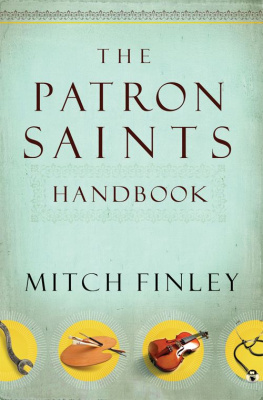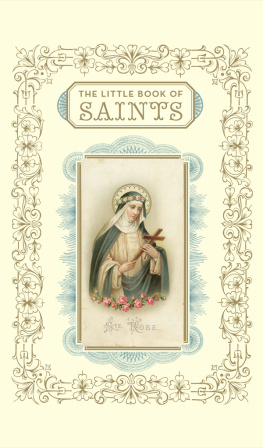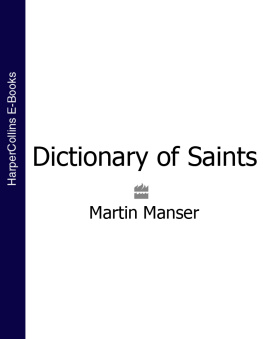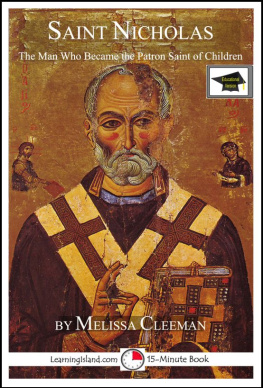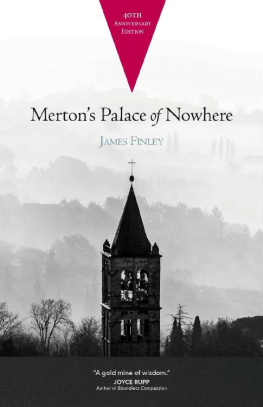Mitch Finley - The Patron Saints Handbook
Here you can read online Mitch Finley - The Patron Saints Handbook full text of the book (entire story) in english for free. Download pdf and epub, get meaning, cover and reviews about this ebook. year: 2010, publisher: Word Among Us Press, genre: Religion. Description of the work, (preface) as well as reviews are available. Best literature library LitArk.com created for fans of good reading and offers a wide selection of genres:
Romance novel
Science fiction
Adventure
Detective
Science
History
Home and family
Prose
Art
Politics
Computer
Non-fiction
Religion
Business
Children
Humor
Choose a favorite category and find really read worthwhile books. Enjoy immersion in the world of imagination, feel the emotions of the characters or learn something new for yourself, make an fascinating discovery.
- Book:The Patron Saints Handbook
- Author:
- Publisher:Word Among Us Press
- Genre:
- Year:2010
- Rating:3 / 5
- Favourites:Add to favourites
- Your mark:
- 60
- 1
- 2
- 3
- 4
- 5
The Patron Saints Handbook: summary, description and annotation
We offer to read an annotation, description, summary or preface (depends on what the author of the book "The Patron Saints Handbook" wrote himself). If you haven't found the necessary information about the book — write in the comments, we will try to find it.
The Patron Saints Handbook — read online for free the complete book (whole text) full work
Below is the text of the book, divided by pages. System saving the place of the last page read, allows you to conveniently read the book "The Patron Saints Handbook" online for free, without having to search again every time where you left off. Put a bookmark, and you can go to the page where you finished reading at any time.
Font size:
Interval:
Bookmark:
THE
PATRON SAINTS
HANDBOOK
BY
MITCH FINLEY

Copyright 2010 by Mitch Finley
All rights reserved
Published by The Word Among Us Press
9639 Doctor Perry Road
Ijamsville, Maryland 21754
www.wau.org
ISBN: 978-1-59325-169-7
14 13 12 11 10 1 2 3 4 5
Unless otherwise noted, Scripture passages contained herein are from the
New Revised Standard Version Bible: Catholic Edition, copyright
1989, 1993, Division of Christian Education of the National Council of
the Churches of Christ in the United States. All rights reserved. Used with permission.
Cover design by John Hamilton
No part of this publication may be reproduced, stored in a retrieval
system, or transmitted in any form or by any meanselectronic, mechanical,
photocopy, recording or any otherexcept for brief quotations in printed
reviews, without the prior permission of the author and publisher. Made and
printed in the United States of America.
Library of Congress Cataloging-in-Publication Data
Finley, Mitch.
The patron saints handbook / Mitch Finley.
p. cm.
Includes bibliographical references (p. ) and index.
ISBN 978-1-59325-169-7 (alk. paper)
1. Christian patron saints. I. Title.
BX4656.5.F56 2010
270.092'2dc22
2010028321
Contents
Saints don't go out of style, and patron saints in particular enjoy a perennial popularity, a few even among members of Protestant denominations and even other religions. Something about the saints attracts and intrigues us. Perhaps it's their special closeness to the mystery of the divine, or their simplicity, or their inclination to thumb their noses at the pretensions of power and wealth. Sometimes they endear themselves to people by their common sense and good humor. Even the saints who were dour or utterly impractical fascinate us.
The Catholic affection for saints was what led to the tradition of adopting saints as patrons of particular causes, groups, or regions. In The Patron Saints Handbook, you'll learn about one hundred such saints. You'll find out, for example, who St. Genesius was and why he is the patron saint of actors. You'll discover why St. Thrse of Lisieux, who spent her life in a cloistered French convent, is the patron saint of missionaries. You'll meet the patron saint of firefighters, songwritersand even astronauts.
Before we go any further on the topic of patron saints, however, we need to have a clear understanding of saints in general and their role in the life of the community of faith. The saints are recommended to us because they excelled at living their lives with great trust and confidence in God. As they willingly and completely opened their hearts to the risen Christ, God was able to do marvelous, frequently delightful, and always inspiring things through them. Because of their heroic virtue, the Church recognizes them as worthy of devotion. That's why they're saints.
At the same time, saints are like anyone who has ever lived in this world and died trusting in the grace of Christ: They live now as they lived then, as members of the Church, the same faith community to which we belong. This is what Catholic tradition calls the communion of saints, and we who flounder around in time and space are every bit as much members of this communion as are the countless souls who went before us. Just as we may ask others here in time and space to pray for us, so also we may ask those who have gone before us into eternity to pray for us.
If saints are our brothers and sisters in Christ and companions on our faith journey, then it makes sense to ask them to be patrons of particular causes. As patrons, we are asking various saints to take a special interest in something that may somehow have related to their lives on earth. This could be a cause, such as the pro-life movement; a group of people, such as parents of large families; or members of a profession, such as dentists or physicians. Churches and dioceses also have patrons, as well as some cities and countries.
St. Francis of Assisi, for example, encouraged his followers to honor and respect the natural world, so he is the patron saint of animals and those who work to protect the environment. He is also the patron of Assisi, Italy, and other cities. St. Francis de Sales was a writer, so he is the patron saint of journalists and writers. St. Clare of Assisi is the patron saint of television because one Christmas when she was too ill to attend Mass, she saw and heard Christmas Mass on her wall, even though it was happening in a different place.
At times popes have named saints as patrons of particular causes. After the conclusion of the First Vatican Council in 1870, Pope Pius IX named St. Joseph, the husband of Mary, as patron of the universal Church. St. Joseph is also the patron of fathers and workers. Patrons also can be chosen by individuals, groups, or organizations. St. Isidore the Farmer is the patron saint of farmers and the United States National Rural Life Conference.
Popular saints such as Mary and St. Joseph are often selected as patrons of numerous causes. Each of the one hundred saints in this book has been identified with only one specific cause, but at times I have noted when a saint is also a patron of another group. Although it's often obvious why a saint is a patron of a particular cause, sometimes there seems to be no connection at all or only a peripheral one. For example, St. John Gualbert is the patron of forest workers because the first monastery he established was in a shady grove of trees.
The saints in this book span the two thousand years of Christianity. In the case of early Church saints, it's sometimes difficult to tell fact from fiction. We usually have good evidence that the saint existed and was martyred, but often legends developed around a particular saint, stories that both entertained and inspired people. Whatever really happened, however, we do know that these men and women were put to death for their belief in Jesus Christ. Their intercession is just as powerful as the saints whose lives we are more familiar with. At times the veneration and practices that followed the saints' deaths are as interesting as the lives of the saints themselves.
There are a few cases in which it's impossible to verify that a saint actually existed. St. Christopher is probably the best example of this situation. Then the Church tends to gently discourage devotion to him or her, although we can still be inspired and delight in these stories that are so much a part of our ancient tradition.
This book is arranged alphabetically by the cause to which a saint is attached. An index in the back of the book also lists the saints alphabetically by their first name so that you can easily find a particular saint. There are far more patron saints than those included in this book, of course, so you'll also find a list of resources for researching other patron saints.
As you read or browse through The Patron Saints Handbook, keep in mind that these saints were human just like all of us. Unlike us, however, they now enjoy what we experience only partially and imperfectly: loving intimacy with the God whom Dante in his Divine Comedy called the Love that moves the sun and the other stars. Yet the very idea of patron saints takes for granted that the saints in heaven know what goes on in this world and in our lives, and they care for us and pray for us when we ask them to do so. How delightful is that!
Mitch Finley
L
aura Vicua was born just three months after a civil war had erupted in Chile in 1891, so her life was in danger soon after it began. Claudio Vicua, a relative of her father, was a prominent figure in the warwhich left him with many enemies. The animosity toward him also threatened Laura and her family, and they moved to the Andean mountains for safety. In 1894 Laura's father died, leaving his wife, Mercedes, alone with her two daughters.Font size:
Interval:
Bookmark:
Similar books «The Patron Saints Handbook»
Look at similar books to The Patron Saints Handbook. We have selected literature similar in name and meaning in the hope of providing readers with more options to find new, interesting, not yet read works.
Discussion, reviews of the book The Patron Saints Handbook and just readers' own opinions. Leave your comments, write what you think about the work, its meaning or the main characters. Specify what exactly you liked and what you didn't like, and why you think so.

